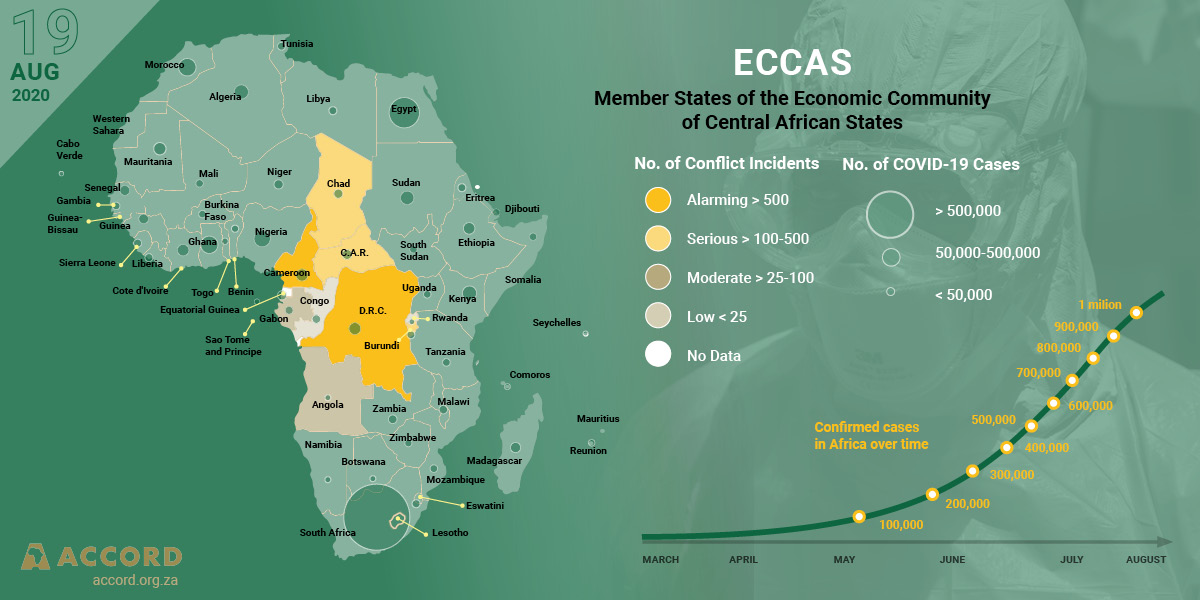The COVID-19 pandemic is having an adverse effect in various domains on countries of the Central Africa sub-region. The Democratic Republic of the Congo (DRC) is the second-most affected country of the region. In the DRC, as in other countries in the region, the school year has been disrupted, businesses have closed, jobs and incomes have been lost, and taxes have not been levied.
COVID-19 has not stalled the ECCAS reform process as some may have feared. Instead, countries in the region have adopted a regional response to the pandemic, which addresses its cross-border aspects @LouncenyFall #C19ConflictMonitor
Tweet
The measures that the pandemic has forced governments to put in place to contain its spread are also affecting people living in the ECCAS zone: movements have been restricted, assemblies have been banned or restricted in terms of the number of participants, some elections have been postponed and political tensions have heightened. Economies are expected to go into recession, despite billions of dollars announced to mitigate the socio-economic impacts of the pandemic.

At a regional level, the unilateral closing of borders undoubtedly exposed the many challenges that Central Africa needs to overcome to achieve regional integration – in particular, the free movement of people. The good news, however, is that the COVID-19 pandemic has also revealed the resilience of the region and regional institutions. Even when restrictions were imposed on the movement of people, ECCAS countries maintained the flow of goods, especially between coastal countries and those that are landlocked.
Although COVID-19 has almost monopolised the attention of the authorities in the DRC and other ECCAS member states, they still managed to move the regional agenda forward, including in response to the pandemic. Central African countries have put together a regional strategy to counter the pandemic, which also addresses cross-border aspects. The ambitious ECCAS institutional reform process – the legal documents of which were adopted by the leaders of the region in December 2019 (just three months before the first case of COVID-19 was confirmed in the region) – is being implemented without major difficulties, despite the pandemic.
It was during the pandemic that the DRC and eight other states ratified the ECCAS revised treaty and finalised the process for the selection of candidates to fill the positions in the newly established ECCAS Commission. The Commission is expected to be operational in a few weeks, despite COVID-19, and the DRC will designate the Commissioner for Gender Promotion, Human and Social Development. During the pandemic period, one ordinary summit took place – the first since 2015 – attended by President Tshisekedi and eight other heads of state out of the 11, and two ministerial meetings also took place. Another summit is expected in the coming months.
Given its size, geographic position, population and economic potential, the DRC is a key ECCAS member and is expected to play an important role in the implementation of the ECCAS reform process. It is clear that the country, under the leadership of President Tshisekedi, is willing to play such a role, as evidenced by its active participation in all ECCAS meetings and events, including all summits held since last year. The COVID-19 pandemic has not altered the commitment of the DRC to regional integration in Central Africa – further shown by the DRC’s payment of its arrears to ECCAS. Such commitment should be commended and encouraged, as it is only through collective action that ECCAS member states can defeat COVID-19 and address the many other challenges facing the subregion.
François Louncény Fall is Special Representative of the UN Secretary-General and head of the UN Regional Office for Central Africa.

